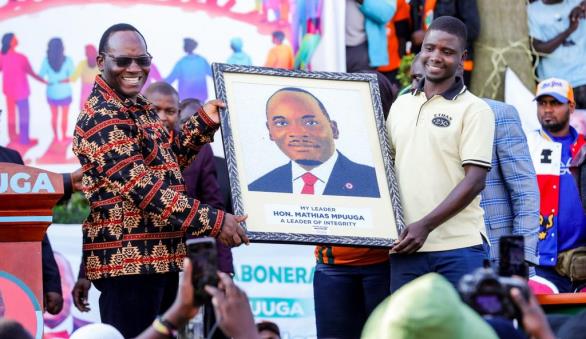The Inspector General of Police Gen.[9] Kale Kayihura told journalists at a press conference held at police headquarters in Naguru on 14 July 2016 that, “the images that were shown on television and social media were selective.[5]
Check also: Omalla Suspended Over Election Offenses
They did not show the whole incident where crowds threw stones at the police.[10] That is not journalism.” Gen. Kayihura said in a systematic attack to the media.[2] The IGP however did not show any proof of Ugandans throwing stones at police officers by providing the journalists with alternative footage and pictures of the said incident.[1]
Follow @newslexpointGeneral Kale Kayihura condoned the inhuman conduct of police.
The use of teargas, rubber bullets has been eliminated.[9] The only option remaining for the commander at the scene is use of water cannons or baton charge,” Kayihura told journalists.
It is important to note that the role of the media in such circumstances which the Inspector General of Police, Kale Kayihura has not rebutted,[7] was to expose the gruesome behavior of the “would be” professional and nonpartisan police that is mandated to ensure safety and security of citizens and has become the tormentors of Ugandan citizens.[5] It should be noted that the police had not ruled out any of Besigye‘s supporters waiting at the roadside and waving at him,[12] therefore justifying the unjustified use of force on them by the stick-wielding men
In a pluralistic society,[8] the media is not supposed to report what is only favorable to emotions of the police or the State, but also information that may be disturbing and, or annoying[9]That is what is meant by freedom of expression and free flow of information and ideas in a democratic society.
This is not the first time that the police leadership is shifting blame for its erroneous acts to the media.[10] Notable among the numerous times is the 12 October 2015 incident,[6] when the IGP and the police spokesperson Fred Enanga independently told journalists that the television media were biased when showing the Forum for Democratic Change mobiliser Zainab Naigaga being undressed during her arrest, “with the intention of portraying police negatively”.[2]
The 12 January 2015 incident about the brutal assault of a television journalist,[2] Andrew Lwanga by a senior police officer and the April 2014 incident when FDC’s Ingrid Turinawe’s breast was fondled by police officers.
In all these incidences, the police have blamed the media of biased reporting and casting it in bad light.[13] It however never produces justification to this effect.
Freedom of expression and the media is well entrenched in the Constitution of the Republic of Uganda.[9] The Government and the Uganda Police Force should respect the spirit of Article 29(1)(a) of the said Constitution which guarantees freedom of expression,[7] and Article 40(2) which provides that every person in Uganda has a right to practise his or her profession.[4]
The citizens rely on press to expose corruption, maladministration and all other forms of injustice or the inefficient and ineffective workings of the private and public officers.[2]
Owing to this persistent trend, HRNJ-Uganda states as follows:
While the media welcomes positive criticism where the practitioners fall short of their professional requirement,[12] such condemnation should be objective and backed up with solid evidence to allow for progressive reformation of the media industry.
The IGP should desist from using intimidating tactics and/or language so as to stifle, muzzle and create self-censorship in the media. Covering up for police brutality is not one of the functions of media, [6]but balanced and fair reporting. In an event the police is not happy with what is carried by the media, the force should release its own footage of the events to support such allegations.[9]
The police should stop inciting the public against the media –especially the frontline reporters by wrongly shifting the blame on the media as a cover up for the force’s professional inadequacies.[8]
The police should priotise ensuring the safety and security of journalists where it has most expertise while letting other issues especially those pertaining to the media be handled by the respective professional bodies.[3]
Suppression of the media is detrimental to freedom of expression and the attendant decision-making processes and entrenchment of a democracy and good governance. [2]Police should therefore play a part in collectively advocating for a free press and freedom of expression.[14]
Source: ifex
Check also;
- Gunmen Attack Remote Police Post In Uganda, Police Arrests More Suspects
- Police In Uganda Surrounded FDC Leaders, Ingrid Turinawe Missing
- Kenyan Police Fired Tear gas & Water Canon At Protesters
Please use the button below to contribute to Newslex Point, Inc. using a credit card or via PayPal.

 Newslex Point News in Uganda, Uganda news
Newslex Point News in Uganda, Uganda news












